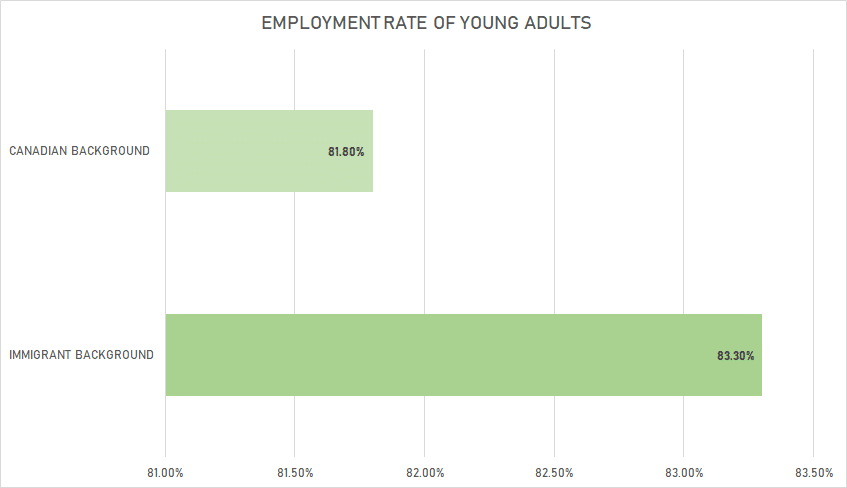Children of immigrants do better in school but many fall short in labour market: study
The children of immigrants are helping increase the general level of education in Canada, a new study shows.
A Statistics Canada study of the 10-year outcomes of children who were aged 13 to 17 in 2006 found that the children of immigrants were better educated than those with Canadian-born parents.
"In Canada, contrary to several European countries, children with an immigrant background are generally more likely than their non-immigrant counterparts to embark on and complete post-secondary studies," study author Martin Turcotte writes.
Using Canadian census data from 2006 and 2016, the study found that the success of immigrant children varied depending on the region their parents left for Canada.
Turcotte wrote that studying the education outcomes of children with an immigrant background by their regions of origin serves the dual purpose of better understanding “the unmeasured factors” responsible for the success of some and developing “targeted support programs” for those falling short.
The study found that the children of most regions outside Canada were more likely to have a post-secondary degree than kids who were third-generation Canadian or higher. Among those aged 13 to 17 in 2006, 72 per cent of the children of immigrants and 67 per cent of third-generation Canadians had completed some form of post-secondary education.
From the same cohort, 43 per cent of the children of immigrants, and 29 per cent of the children studied whose parents were born in Canada completed a university degree.
The children of immigrants from East Asian countries like China and Japan were more likely to achieve a higher level of education than the grandchildren of immigrants from the same region. These children were two-and-a-half times more likely to hold a university degree than those who were third-generation or higher and were twice as likely to obtain a university degree in Science, Technology, Engineering or Mathematics (12 per cent versus 6 per cent).
The children of immigrants from the Carribean and Bermuda and Central America were less likely than their third-generation counterparts to complete post-secondary education.
Though the study never concluded as to why the children of immigrants seem to be achieving higher education levels, it cited literature that had looked into some possible contributing factors.
Turcotte noted studies that show immigrants to be "motivated and ambitious" and focused on building a better future for themselves and especially their children.
“And this better future is often based on their children’s academic success,” Turcotte writes. “In general, immigrant parents have higher expectations and aspirations for their children than parents born in this country and do everything they can to pass this ambition onto them.”
The statistics tell this tale — among those whose parents had no more than a high school diploma, children with an immigrant background were more likely to have a university degree than children of Canadian-born parents.
Labour market outcomes
Despite these educational outcomes, the employment rate of young adults with an immigrant background (83.3 per cent) was only one-and-a-half per cent higher than for those of Canadian-born parents, which stood at 81.8 per cent.

As with education, the employment rate varied by region of origin.
| Region of origin | Employment rate |
|---|---|
| Canada | 81.8 |
| East Asia | 86.8 |
| Southern Europe | 85.7 |
| Southeast Asia | 85.0 |
| Western Europe | 84.5 |
| Oceania and other | 84.5 |
| Eastern Europe | 84.4 |
| Northern Europe | 84.2 |
| South Asia | 82.6 |
| North Africa | 81.5 |
| Sub-Saharan Africa | 81.0 |
| Caribbean and Bermuda | 78.2 |
In terms of wages, the median annual earnings of young adults with an immigrant background were higher than those of their counterparts born to Canadian parents ($46,580 and $43,470 respectively, for a difference of about $3,110).
Looked at by region of origin, the difference was greater for young adults from East Asia, who earned $12,200 more annually than third- or higher-generation Canadians. By contrast, young adults with an immigrant background from Central America and the Caribbean and Bermuda earned $5,030 and $5,800 less, respectively.
In terms of wages, the study found women tend to have similar earnings to those who had Canadian-born parents but greater differences exist when it comes to men.
Even with the same level of education, the sons of immigrants from many regions of origin were paid less for full-time, full-year work than those whose parents were born in Canada.
The study did not discuss the extent to which factors related to culture, discrimination, or aspirations by region contributed to the results.
Find out if you are eligible for any Canadian immigration programs
© 2019 CIC News All Rights Reserved
- Do you need Canadian immigration assistance? Contact the Contact Cohen Immigration Law firm by completing our form
- Send us your feedback or your non-legal assistance questions by emailing us at media@canadavisa.com







